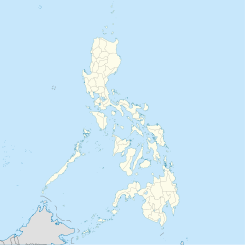Pangasinan Provincial Capitol
| Pangasinan Provincial Capitol | |
|---|---|

Façade of the Capitol
|
|
| Alternative names | Lingayen Capitol |
| General information | |
| Type | Government Building |
| Architectural style | Neo-classical |
| Location | Lingayen, Pangasinan |
| Country | Philippines |
| Coordinates | 16°02′01″N 120°13′53″E / 16.033513°N 120.231519°ECoordinates: 16°02′01″N 120°13′53″E / 16.033513°N 120.231519°E |
| Current tenants |
Office of the Governor Provincial Government of Pangasinan |
| Groundbreaking | 1917 |
| Completed | 1918 |
| Renovated | Latest renovation in 2008 |
| Technical details | |
| Floor count | two |
| Design and construction | |
| Architect | Ralph Harrington Doane |
| Known for | One of the Eight Architectural Treasures in the Philippines |
| Website | |
| www.pangasinan.gov.ph | |
The Pangasinan Provincial Capitol, on Lingayen Gulf, is the present seat of the government of Pangasinan. It was declared as one of the eight Architectural Treasures of the Philippines by the National Commission for Culture and the Arts. Located in Lingayen, this government building was constructed during the term of the late Governor Daniel Maramba, the "Grand Old Man of Pangasinan".
The provincial capitol, designed by Daniel Burnham, was built on April 21, 1917 and was completed in 1918 with a budget of three hundred thousand pesos. Twenty five hectares of land was obtained by the provincial government and the construction was led by the seventh governor of Pangasinan Daniel Maramba; Members Segundo Estaris and Victor Tomelden; Treasurer J.W. Crow; District Engineer Chas Dandors; and Consulting Architect Ralph Harrington Doane.
The building was made of poured concrete with limestone on the exterior to display its warm color. Part of the plan was to include a court house, jail, garage, storeroom, hospital and residences for the governor and provincial treasures. The entire building is rectangular in plan with two to three stories in height, and set on a podium with several steps. At the center of the façade is the entrance with several doors sheltered by a canopy. The exterior has minimum wall surfaces but maximum window openings to bring in cool sea breeze. The entire structure is guarded from the sun and rain by its colonnade and projecting cornices surrounding the buildings. Inside are big rooms that had high ceilings and large windows were lined along wide corridors, giving an impression of an open pavilion. The architecture style is marked by the use of columns, entablatures and pediments. To make it an enhanced capitol building, the plan used two stories with a monumental main floor lobby and court room on the second floor.
During World War II it was severely damaged and in 1949, it was reconstructed by the provincial board led by the fourteenth governor of Pangasinan Enrique Braganza; Members Vicente Soliven and Miguel de Vera; Treasurer A.F. Buenaventura and District Engineer V.B. Oledan to its pre-war grandeur.
Governor Victor Agbayani, Governor Espino's predecessor, properly restored the building, hiring restoration architect Rene Luis Mata to lead the project. Espino, however, removed several historical elements of the building through misguided renovations. The building underwent a general facelift under Espino from 2007 to 2008 with the help of Architect Chris David of Pampanga, which led to the unfortunate alteration of the historical character of the interior.
...
Wikipedia

